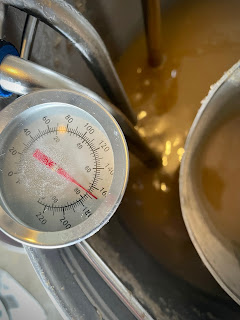Here's a rundown on our latest brew day where we are attempting a clone of Stone & Wood's famous Pacific Ale.
Here is the recipe we're using. Essentially it's a 60/40 split of pale malt and wheat, with US-05 yeast and exclusively galaxy hops.
Starting out we setup our strike water and sparge water in our BrewZilla and Digiboil units, and made the water adjustments as per Brewfather. We used the 'hoppy' water profile in Brewfather which has high sulphate levels to help accentuate the hop flavours. We've noticed when drinking Pacific Ale, particularly on tap the really dry finish which is indicative of high sulphate levels.
We haven't got our own grain mill (yet) so we have our grain milled by our local homebrew store when we purchase it. We added the pale and wheat malt together into the BrewZilla for the mash, then added the flaked wheat onto the top of the grain bed but didn't mix it in entirely. We've heard of others utilising this method to help reduce the stickiness of the mash and help with recirculation. After doughing in we let the grain bed settle for around 10 minutes before taking a small sample for our pH reading.This is our first time using a pH meter to test our water acidity levels. We added 2 of the 3mL of 85% phosphoric acid as recommended by Brewfather to get a target pH of around 5.3. Our first test returned a result of 5.65.
We then added another 1mL of phosphoric acid to the mash, waited another 5-10 minutes and took another sample which gave us a reading of 5.45. Close enough for us to 5.3 and well within the acceptable range of 5.2 - 5.6. Mash pH is a bit of a moving target, so hitting an exact number is not a huge deal for us, so long as we're in the correct range.
We set the BrewZilla to recirculate with the lid on and adjusted the temperature to reach 65C at the top of the grain bed which we measure with a separate long probed thermometer.
We stirred the grain bed 3 times during the 60 minute mash process before lifting the grain basket and beginning the sparge.
We took a pre-boil gravity reading and was pleased to find it 1 point over our expected pre-boil gravity of 1.046.We're still developing trust in the accuracy of our digital hydrometer so we measured with our floating hydrometer as well which showed the same reading on both.
We set our BrewZilla to boil and continued sparging until we reached our target volume of approx 25.5L. The sparge started to slow down towards the end but had a fairly constant flow and never got stuck.
Once our wort was boiling we started a 30 minute timer (as the recipe we're using is calculated based off a 30 minute boil).
We measured out our first galaxy hop addition which is relatively small at only 8g, along with 15g of yeast nutrient.
At the halfway point of the boil (15 minutes elapsed, 15 minutes left), we added this addition of hops and yeast nutrient. We then measured out our second galaxy hop addition (16g) which was added with 5 minutes left in the boil, then our final and largest hop addition (40g) which was added during the whirlpool after the boil had finished.
We overshot the cooling of the wort for our whirlpool so the temperature ended up dropping to around 76C instead of the target 80C - may lead to a little less bitterness being extracted but we don't anticipate it will be a huge problem - guess we'll find out in a couple of weeks.
After the whirlpool we continued cooling the wort using the BrewZilla stainless steel immersion chiller before transferring to our Apollo PET fermenter.Original gravity reading is 1.051, confirmed again with the digital and floating hydrometers, which was 2 points higher than expected from the recipe. So we'll end up with a tiny bit more alcohol in the end product than expected. Perhaps we'll call it an "Extra Pacific Ale"?
The colour looks really good, and judging by the sample from the hydrometer, probably not far off the colour of the actual Stone & Wood Pacific Ale. After pitching our US-05 yeast, we had fermentation activity underway the next morning.
Fermentation is set to a target temperature of 19C with an expected final gravity of 1.010.
As you can see from the graph below, fermentation completed in a few days reaching the expected FG of 1.010. Once FG was reached, we raised the temperature a couple of degrees to help the yeast along with cleaning up diacetyl and any other unwanted byproducts from fermentation.
We confirmed the FG reading using our trusty floating hydrometer which confirmed 1.010. This gives us an ABV of 5.4%.
After initiating a soft crash to 12C, we added our 80g dry hop charge of galaxy hops which was left in the fermenter for 48 hours before transferring to our keg.


















I'm very keen to hear how this one turned out! I'm looking to do the same/similar recipe with a 3 week grain to glass (kegged) turnaround.
ReplyDelete